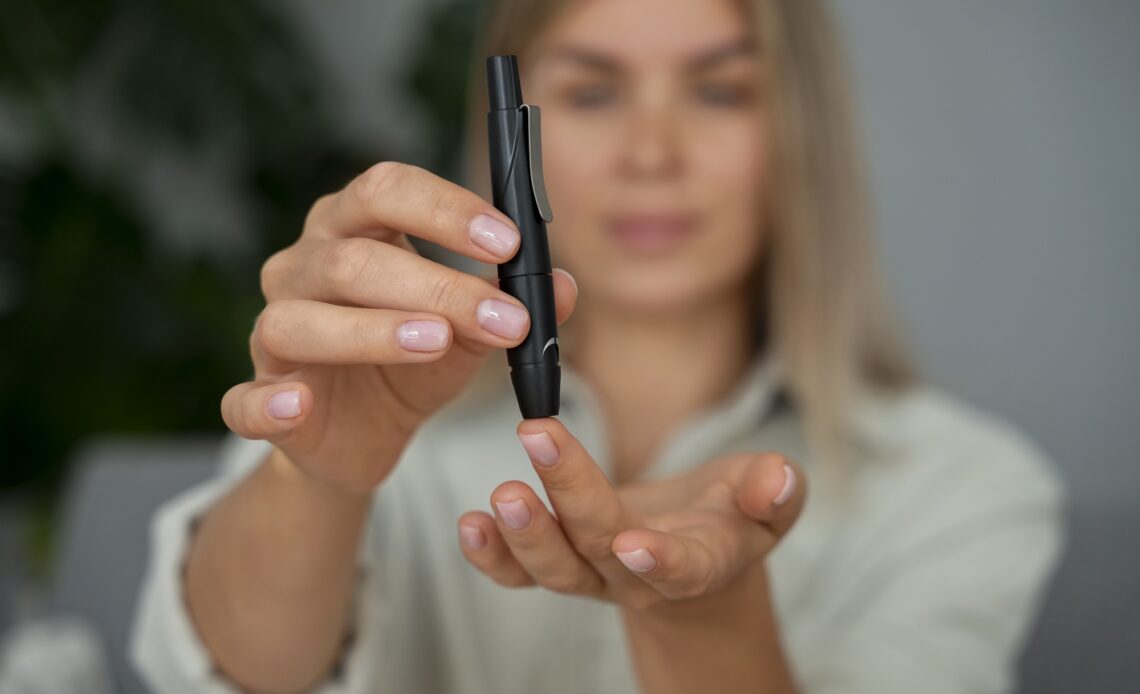The pancreas produces insulin, a crucial hormone that regulates blood sugar levels by allowing glucose to enter the body’s cells for energy or storage. However, insulin resistance occurs when the body’s cells become less responsive to insulin, causing glucose to build up in the bloodstream. This condition can lead to weight gain, type 2 diabetes, and cardiovascular disease. Understanding insulin resistance’s causes and mechanisms is key for effective management and prevention. Factors such as genetics, lifestyle, and environmental influences affect insulin resistance. In women, Polycystic Ovary Syndrome (PCOS) and hormonal imbalances are closely linked to this condition. This article explores the complex relationship between insulin resistance, PCOS, and hormones, and their impact on women’s health and well-being.
The Link Between Insulin Resistance and PCOS
Polycystic Ovary Syndrome (PCOS) is a hormonal disorder that affects approximately 5-10% of women of reproductive age. Irregular menstrual cycles, excess androgen (male hormone) production, and the development of small, fluid-filled cysts on the ovaries characterize this condition.

One of the hallmarks of PCOS is its strong association with insulin resistance. In fact, insulin resistance is considered a key component of PCOS, with up to 70% of women with PCOS also experiencing insulin resistance. This connection is crucial, as insulin resistance can contribute to the development and progression of PCOS, further exacerbating the condition.
The mechanisms behind the link between PCOS and insulin resistance are complex and multifaceted. Excess androgen production, a common feature of PCOS, can disrupt insulin signaling and lead to decreased insulin sensitivity. This, in turn, can result in higher insulin levels, which can further stimulate androgen production, creating a vicious cycle. Additionally, the presence of excess fat, particularly around the abdomen, can amplify insulin resistance in women with PCOS, as adipose tissue (fat tissue) can contribute to increased inflammation and disrupted insulin function.
Hormonal Imbalances and Their Impact on Insulin Resistance
Hormones play a critical role in regulating various bodily functions, including glucose metabolism and insulin sensitivity. In women, the delicate balance of hormones, such as estrogen, progesterone, and androgens, can significantly impact the development of insulin resistance.
Estrogen, the primary female sex hormone, has been shown to play a protective role in insulin sensitivity. Adequate levels of estrogen can help maintain insulin sensitivity and glucose homeostasis. However, fluctuations or imbalances in estrogen levels, as seen in conditions like PCOS, can contribute to the development of insulin resistance.
Progesterone, another important female hormone, also influences insulin sensitivity. Progesterone can counteract the effects of insulin, leading to increased insulin resistance. Imbalances in the ratio of estrogen to progesterone, such as those observed in PCOS or during certain stages of the menstrual cycle, can disrupt the body’s ability to respond effectively to insulin.
Androgen hormones, such as testosterone, can also play a significant role in insulin resistance. Excess androgen production, a hallmark of PCOS, can interfere with insulin signaling and lead to decreased insulin sensitivity. This hormonal imbalance can further exacerbate the risk of developing insulin resistance and related health complications.
Symptoms and Signs of Insulin Resistance in Women
Recognizing the symptoms and signs of insulin resistance is crucial for women, as early detection can lead to timely intervention and management. Some of the common symptoms and signs associated with insulin resistance in women include:

- Weight gain or difficulty losing weight: Insulin resistance can contribute to weight gain, particularly around the abdomen, making it challenging to lose weight despite diet and exercise efforts.
- Acanthosis nigricans: This is a skin condition characterized by dark, velvety patches on the neck, armpits, or other areas, often indicating the presence of insulin resistance.
- Irregular menstrual cycles: Insulin resistance can disrupt the normal menstrual cycle, leading to irregular, missed, or prolonged periods.
- Increased facial and body hair growth (hirsutism): Excess androgen production associated with insulin resistance can result in increased facial and body hair growth in women.
- Skin tags: Small, soft, flesh-colored growths on the skin, often found in areas where skin rubs against skin, can be a sign of insulin resistance.
- Fatigue and energy fluctuations: Insulin resistance can contribute to feelings of fatigue, lack of energy, and energy fluctuations throughout the day.
- Increased thirst and urination: Insulin resistance can lead to higher blood sugar levels, which can cause increased thirst and frequent urination.
If you are experiencing any of these symptoms, it is important to consult with a healthcare professional for proper evaluation and diagnosis.
Managing Insulin Resistance Through Lifestyle Changes
While insulin resistance and PCOS can pose significant health challenges, there are several effective lifestyle interventions that can help manage these conditions and improve overall well-being. Here are some key strategies to consider:
- Dietary modifications: A balanced, low-glycemic diet that emphasizes whole, nutrient-dense foods can be highly beneficial. This includes focusing on lean proteins, complex carbohydrates, healthy fats, and fiber-rich fruits and vegetables. Reducing the intake of refined carbohydrates, added sugars, and processed foods can help improve insulin sensitivity.
- Regular physical activity: Engaging in regular exercise, such as a combination of aerobic activities and strength training, can significantly enhance insulin sensitivity and promote weight management. Aim for at least 150 minutes of moderate-intensity exercise or 75 minutes of vigorous-intensity exercise per week.
- Weight management: Maintaining a healthy body weight or achieving gradual weight loss can be highly beneficial for managing insulin resistance and PCOS. Even a modest weight loss of 5-10% of your body weight can have a positive impact on insulin sensitivity and overall health.
- Stress management: Chronic stress can contribute to insulin resistance by triggering the release of hormones like cortisol, which can disrupt insulin function. Incorporating stress-reducing activities, such as meditation, yoga, or deep breathing exercises, can help mitigate the negative effects of stress on insulin sensitivity.
- Adequate sleep: Getting sufficient, high-quality sleep is crucial for maintaining optimal insulin sensitivity. Aim for 7-9 hours of sleep per night and establish a consistent sleep routine.
- Monitoring and tracking: Regularly monitoring your blood sugar levels, weight, and other relevant metrics can help you identify patterns and make informed decisions about your health management strategies.
By implementing these lifestyle changes, women with insulin resistance and PCOS can take an active role in managing their condition and improving their overall health and well-being.
Medications and Treatments for Insulin Resistance and PCOS
While lifestyle modifications are the cornerstone of managing insulin resistance and PCOS, in some cases, medical interventions may be necessary to address the underlying hormonal imbalances and improve insulin sensitivity. Here are some common treatments and medications that may be prescribed:

- Metformin: This medication is often the first-line treatment for insulin resistance and PCOS. Metformin helps improve insulin sensitivity, reduce blood sugar levels, and can also assist with weight management.
- Insulin-sensitizing agents: Other medications, such as thiazolidinediones (e.g., pioglitazone) and glucagon-like peptide-1 (GLP-1) agonists, may be used to enhance insulin sensitivity and improve glycemic control.
- Oral contraceptives: Birth control pills containing a combination of estrogen and progestin can help regulate menstrual cycles, reduce androgen levels, and improve symptoms associated with PCOS.
- Anti-androgen medications: Medications that block the action of androgen hormones, such as spironolactone or flutamide, can be used to manage excess hair growth, acne, and other androgen-related symptoms in women with PCOS.
- Ovulation-inducing medications: For women with PCOS who are trying to conceive, medications like clomiphene citrate or letrozole may be prescribed to help induce ovulation and improve fertility.
- Supplements: Certain supplements, such as inositol, omega-3 fatty acids, and vitamin D, have been studied for their potential benefits in managing insulin resistance and PCOS symptoms.
It’s important to work closely with your healthcare provider to determine the most appropriate treatment plan for your individual needs, as the management of insulin resistance and PCOS may require a combination of lifestyle modifications and medical interventions.
Support and Resources for Women with Insulin Resistance and PCOS
Navigating the challenges of insulin resistance and PCOS can be overwhelming, but there are numerous support resources and communities available to help women manage these conditions effectively. Here are some valuable resources to consider:
- Support groups: Joining a local or online support group can provide a sense of community, connect you with others facing similar experiences, and offer emotional support and practical advice.
- Educational resources: Reputable organizations, such as the PCOS Awareness Association and the Endocrine Society, offer comprehensive information, educational materials, and guidelines for managing PCOS and insulin resistance.
- Healthcare providers: Building a strong relationship with your healthcare team, including your primary care physician, gynecologist, and/or endocrinologist, can be instrumental in receiving personalized care and guidance.
- Nutrition and fitness experts: Consulting with a registered dietitian or a certified personal trainer who specializes in PCOS and insulin resistance can help you develop effective dietary and exercise plans tailored to your needs.
- Mental health support: Managing the emotional and psychological aspects of PCOS and insulin resistance is crucial. Seeking support from a therapist or counselor can help you navigate the challenges and improve your overall well-being.
- Online communities: Joining online forums, social media groups, or discussion boards can connect you with a wider network of individuals experiencing similar challenges, allowing you to share experiences, ask questions, and find practical tips.
Remember, you are not alone in your journey. By seeking support, accessing educational resources, and working closely with your healthcare team, you can take control of your insulin resistance and PCOS, and ultimately improve your overall health and quality of life.
Conclusion
By recognizing the symptoms and signs of insulin resistance, seeking timely diagnosis, and implementing comprehensive management strategies, women can take control of their health and achieve better outcomes. Lifestyle modifications, such as adopting a balanced, low-glycemic diet and engaging in regular physical activity, can have a significant impact on insulin sensitivity and overall metabolic health.
In cases where lifestyle changes alone are not sufficient, medical interventions, including medications and targeted treatments, may be necessary to address the underlying hormonal imbalances and improve insulin resistance. Additionally, seeking support from healthcare providers, joining supportive communities, and accessing educational resources can empower women to navigate the challenges of insulin resistance and PCOS with confidence and resilience.


